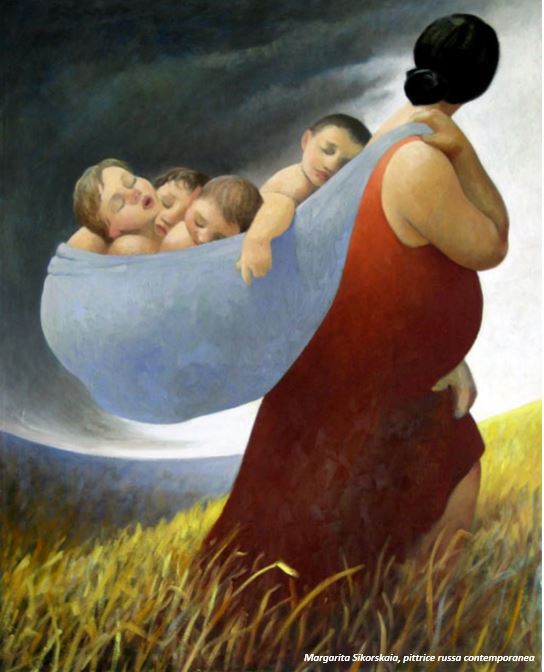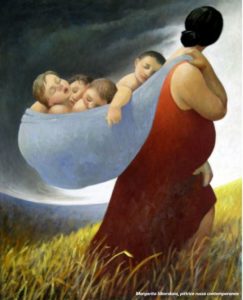
We take a stand for human rights in everyday life
By Fiorella Capasso,Fiodanice-Cultures en dialogue
December 2019
This month we celebrate the birth of Jesus in Bethlehem: for the Christian religion, God becomes man and descends to the earth to save humanity. For us Christians, this period represents the light that guides us in dark times: Christmas is an opportunity for rebirth, a break with the past and a new beginning (cf. Mt 2,1-2).
The Universal Declaration of Human Rights was also born in December, of 1948, a new beginning for Humanity: breaking with the horrors of the Second World War, the death of over 50 million people and the extermination of the Jewish people.
It evokes the universal need for a web of values made up of dignity, freedom, equality and brotherhood…which are the “ingredients” of justice! The Declaration represents the culmination of what was then a widespread awareness in public opinion in all countries involved in the world conflict, that is, the principle of equal dignity, source of equal rights, of all human beings.
The Declaration of 1948 begins, in fact, as follows: “All human beings are born free and equal in dignity and rights. They are endowed with reason and conscience and should act towards one another in a spirit of brotherhood”. The value of human rights extends far beyond tradition, Western or not, and their protection must be guaranteed regardless of the context in which one finds oneself, be it cultural, religious or of any other kind.
There is an indomitable feminine spirit behind this historical innovation of the right to dignity, freedom, equality and brotherhood: that of Eleanor Roosevelt, wife of the American President, defined as the “First Lady of the World”. “We stand today at the threshold of a great event both in the life of the United Nations and in the life of mankind. This Universal Declaration of Human Rights may well become the international Magna Carta of all men everywhere”, Eleanor Roosevelt wished, as President and most influential member of the United Nations Commission on Human Rights. A woman was the driving force behind the creation, in 1948, of this sort of universal statute of freedoms!
For the first time in the history of human rights, man must henceforth be guaranteed “the right to have rights”, simply on the basis of his belonging to the human race, regardless of whether he is a citizen of a state. Unfortunately, however, history and even contemporary history confirm to us every day that the recognition of a right is not a guarantee of its effectiveness, nor of its permanence in time. The struggle for human rights will be forever!
Those who believe that the rights of the person are the reason and measure of personal commitment and public institutions, can only remain open to the challenges of the signs of the times. Human life and human history, in our complex and diverse world, which collide more and more often, are bringing new needs to the fore which are waiting to be recognized by society and its institutions.
Certainly, if we question ourselves about the universality of the concept of human rights in different cultures, we must realize that it is not a universal concept… and yet there is a fundamental need that is perceived everywhere and at all times, “something is due to the human being simply because they are human beings: the recognition of a dignity that they claim because they consciously aspire to a future, and because their life finds in this a sense of which they are willing to pay the price”.[1]
We are thus confronted with the fundamental problem of our multicultural societies: how is it possible to combine justice, that is, the recognition of what is owed to each human being, universally and without distinction, and pluralism of human stories and events? It is not only a question of existence, but also of appreciation and coexistence between different and contrasting religious and cultural identities.
As for us, the Positions of the Congregation on migration, integral ecology, economic justice, fighting trafficking and protecting women, girls and children – taken up by the challenges of the Strategic Plan of our Unit (for further information go to: The positions of the Congregation) – represent an important compass for our ministries in the stormy sea of human rights, in this age of globalization of indifference.

But how to “remain human”, universally, and live our daily lives in harmony with the values of the Declaration of ’48? Eleanor Roosevelt helps us again: “Where, after all, do universal human rights begin? In small places, close to home – so close and so small that they cannot be seen on any maps of the world. Yet they are the world of the individual person; the neighbourhood he lives in; the school or college he attends; the factory, farm, or office where he works. Such are the places where every man, woman, and child seek equal justice, equal opportunity, equal dignity without discrimination. Unless these rights have meaning there, they have little meaning anywhere. Without concerted citizen action to uphold them close to home, we shall look in vain for progress in the larger world. Therefore we believe that the destiny of human rights is in the hands of all citizens in all our communities[2]. ”
